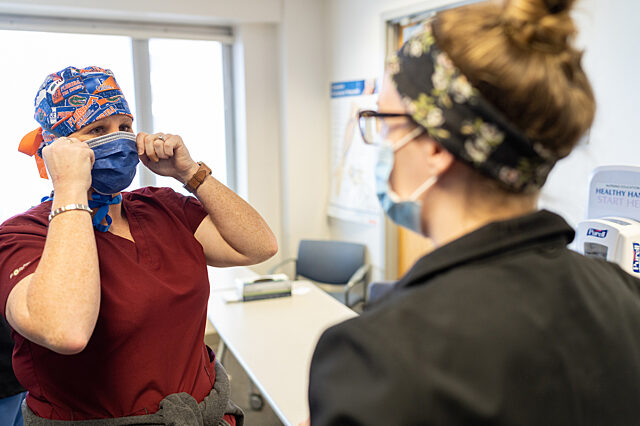A Cancer Patient’s Guide to COVID-19

Cancer doesn’t stop — not even for the novel coronavirus disease, COVID-19. The unknowns related to the virus are leaving people concerned, especially cancer patients who may have weakened immune systems as a result of cancer treatment and/or may be older.
The Florida Cancer Control and Research Advisory Council (CCRAB), North Central Florida Cancer Control Collaborative (NCFCCC) and the UF Health Cancer Center recently hosted the webinar “Cancer in the time of Coronavirus,” with Christopher Cogle, M.D., an oncologist and UF professor of medicine, and Amar Kelkar, M.D., a UF hematology and oncology fellow. They provided information for cancer patients, survivors, caregivers and providers on how to best navigate cancer treatment and survivorship during the coronavirus pandemic.
Here are their answers to some COVID-19-related questions that cancer patients may have:
What is COVID-19? How can I contract it? How can I prevent it?
Coronaviruses are a family of viruses that typically cause respiratory illness. COVID-19 is caused by a novel coronavirus originating from an outbreak in Wuhan, China.
COVID-19 causes respiratory illness and spreads from person to person through droplets released into the air by infected individuals. These droplets can also live on surfaces for several hours to days. Other people contract the disease by breathing in the droplets or touching surfaces they land on and then touching their eyes, nose or mouth. The most common symptoms of this coronavirus include cough, fever or shortness of breath.
Although there are no vaccines yet for COVID-19, prevention right now includes washing hands frequently, social distancing and wearing a mask to prevent touching your face.
To learn more about COVID-19, check out the Centers for Disease Control and Prevention’s fact sheet.
Am I at higher risk of becoming critically ill from COVID-19 because I have cancer?
According to the American Cancer Society, patients who are currently fighting cancer and some cancer survivors are at higher risk for COVID-19 due to weakened immune systems caused by cancer and chemotherapy. Another risk for many patients with cancer is older age. Being higher risk means a greater chance of catching the infection and a higher chance of developing severe pneumonia or multi-organ system failure.
When should I…?
Call my doctor?
You should call your oncologist as soon as you show symptoms, including fever, cough, shortness of breath, tiredness, diarrhea, dehydration, worsening cancer or cancer treatment symptoms, or if someone in your home tests positive for COVID-19.
Get tested?
Seek a COVID-19 test if you have a fever or cough. Call your primary care provider to discuss your symptoms. All community exposures will be referred to the Department of Health in your respective county; however, in order to streamline the process, please contact your doctor first. If you do not have a primary care physician, please contact the health department in your area. Residents of Alachua, Duval, Lake County, Marion and Sumter counties can find more information here.
Go to the hospital?
Try to avoid the hospital unless you have shortness of breath, low neutrophil count (also called neutropenia) and fever, or history of transplant and fever.
What precautions are my oncologists taking to protect me?
Your oncologist may reduce the dosage of your medication or radiation, delay surgery, delay the start of medication or radiation, use telehealth visits or home health care rather than clinic or hospital visits, or switch from medication injections to oral drugs. Your oncologist may also start using growth factors such as erythropoietin or G-CSF to boost your blood counts.
Doctors make these adjustments based on a balance between your risks for cancer progression or relapse and your risks for COVID-19.
Why isn’t my doctor delaying my cancer treatment during this time?
If your doctor is not delaying your treatment, it’s because of a high need to treat the cancer now. For example,
- You have a disease with high-risk of progression or relapse.
- Your surgery is time-sensitive.
- There may be no alternative treatments available.
- Without therapy, you may die in the next two to four weeks.
- Your symptoms may not be controlled by oral medications.
- You may have life-threatening complications from the disease.
Where can I look for accurate, up-to-date information about COVID-19?
Check out these resources for COVID-19 information and updates:
- Centers for Disease Control and Prevention
- Centers for Disease Control and Prevention Travel FAQ
- American Cancer Society
- Cancer.Net
- Florida Department of Health
- NPR Social Distancing FAQ
Provided by By Christopher Cogle, M.D. and Amar Kelkar, M.D..